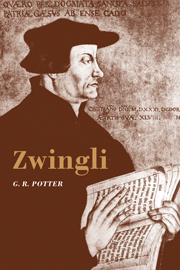Book contents
- Frontmatter
- Contents
- List of maps
- Preface
- Abbreviations used
- map The Swiss Confederation, c. 1515
- 1 Early years
- 2 Parish priest: Glarus and Einsiedeln
- 3 The Zurich ministry
- 4 The first rift
- 5 Road to independence
- 6 From argument to action
- 7 The radical challenge
- 8 Peasants, opposition, education
- 9 Reform and reaction
- 10 Berne intervenes
- 11 Zurich and St Gall
- 12 Zwingli and Luther
- 13 Marburg and after
- 14 Gathering storm
- 15 Precarious peace
- 16 The last year
- Index
6 - From argument to action
Published online by Cambridge University Press: 13 October 2009
- Frontmatter
- Contents
- List of maps
- Preface
- Abbreviations used
- map The Swiss Confederation, c. 1515
- 1 Early years
- 2 Parish priest: Glarus and Einsiedeln
- 3 The Zurich ministry
- 4 The first rift
- 5 Road to independence
- 6 From argument to action
- 7 The radical challenge
- 8 Peasants, opposition, education
- 9 Reform and reaction
- 10 Berne intervenes
- 11 Zurich and St Gall
- 12 Zwingli and Luther
- 13 Marburg and after
- 14 Gathering storm
- 15 Precarious peace
- 16 The last year
- Index
Summary
Revolutions are notoriously difficult to date with acceptable accuracy. 14 July 1789, for France, or 6 November 1917, in Russia, are commemorated by public holidays but hardly mark more than particular events. So, too, with the religious revolt of the sixteenth century enthusiastically dated by German protestants from 31 October 1517, or, less enthusiastically, by Anglicans from 1534 – in every case the precise moment of change is alike disputable or meaningless.
This applies also to Zurich. In this case, no one now thinks of 1 January 1519, as anything more than a token date. Perhaps the most convenient event in the various Swiss communities to mark a decisive turning point in religious allegiance is the rejection of the Roman mass. After that had happened, their inhabitants, deprived of the mass, could not be regarded by Catholics as other than heretics. Zurich abandoned the mass on 13 April 1525, thus completing a cycle of events which was set in motion by the First Disputation of January 1523. Zwingli was never excommunicated by name, as Luther was, although from 1523 onwards Zwinglians were liable to be treated as Lutherans by their Catholic neighbours, who had no doubt that they were heretics to be burnt alive if circumstances permitted. Prior to 1524 at least, while the gap between Zurich and Rome was widening, it was not unbridgeable. Abstention from meat during Lent, and even marriage of the clergy, were debatable issues, like indulgences.
- Type
- Chapter
- Information
- Zwingli , pp. 126 - 159Publisher: Cambridge University PressPrint publication year: 1976



